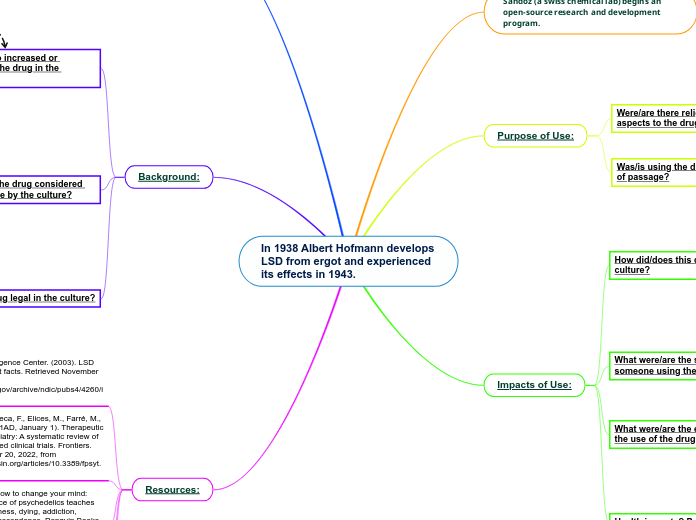In 1938 Albert Hofmann develops LSD from ergot and experienced its effects in 1943.
Sandoz (a swiss chemical lab) begins an open-source research and development program.
Lots of research done with LSD in the 1950's.
Dr. Humphry Osmond and Aldous Huxley conducts research with LSD & develops the term "Psychedelic".
Between 1950-1965 over a thousand scientific articles on psychedelics are written. Alongside 40,000 research subjects and 6 international conferences regarding LSD.
Purpose of Use:
Were/are there religious or spiritual aspects to the drug use?
Richard Alpert becomes known as "Ram Dass" an influential spiritual teacher with lectures surrounding LSD experiences.
Thought to allow the user to experience a "spiritual journey".
Was/is using the drug considered a rite of passage?
Due to the influence of the cultural shift, many saw LSD as a shift in the times to be a part of.
Impacts of Use:
How did/does this drug impact the culture?
Influenced the hippie movement and anti-war movement.
In 1966 Stewart Brand leads a campaign for NASA to photograph the earth from space.
Leads to the rise of the environmental movement.
Changed the style of music that was popular through artists like The Beatles, Jimi Hendrix, and Bob Dylan.
Overall, influenced the upcoming generation to "Turn on, tune in, and drop out"
What were/are the social impacts of someone using the drug?
For the younger generation, this was a way to connect with the cultural change taking place.
Many from the older generation saw this as a waste of time, making you a "degenerate".
What were/are the economic impacts of the use of the drug by this culture?
Due to LSD's influence on the anti-war movement, one could argue this decreased the funding and financial support of the military.
Lead to financial resources being focused on the war on drugs campaign.
Health impacts? Positive? Negative?
Mostly positive health impacts, but some negative.
Had shown to be useful for those overcoming addiction, depression, and potentially anxiety.
Some studies have shown that LSD experiences can bring on schizophrenic symptoms for those who are pre-disposed to schizophrenia.
"MK Ultra" a CIA program tasked with finding military applications for LSD (1953-1973).
Researched the use of LSD as a mind control substance.
Researched the use of LSD as truth serum.
One participant was the Writer Ken Kesey.
"Revolt of the guinea pigs".
Provided LSD to thousands of the young generation in the Bay Area.
Background:
What factors led to increased or decreased use of the drug in the culture?
In the early 1960's LSD begins to circulate outside of the laboratory environment.
Dr. Timothy Leary and Richard Alpert begin conducting studies with LSD at Harvard University.
Tossed from Harvard in 1963 due to research focus as well as methodology.
Set & Setting
"Turn on, tune in, drop out".
In 1960, after studying under Richard Alpert, James Fadiman went to Stanford University for graduate school, continuing LSD studies.
Helped nurture in the spirit of silicon valley.
Was/is the use of the drug considered positive or negative by the culture?
In the 1960's, LSD use influenced cultural shift throughout the young generation.
Psychedelic rock attempted to recreate the "LSD experience" through music
LSD influenced the anti-war movement during the war in Vietnam.
The older generations, particularly political figures (presidents Richard Nixon and Ronald Reagan), framed the drug to be the cause of the anti-war movement.
The beginning of the war on drugs.
Anti-drug campaigns.
False information spread regarding the medical effects of LSD.
Was/is the drug legal in the culture?
California and Nevada are the first states to make LSD illegal.
In 1968 the federal government makes LSD illegal.
In 1970 the federal government categorized LSD as a schedule 1 substance.
Resources:
National Drug Intelligence Center. (2003). LSD Fast Facts. LSD fast facts. Retrieved November 20, 2022, from https://www.justice.gov/archive/ndic/pubs4/4260/index.htm
Fuentes, J. J., Fonseca, F., Elices, M., Farré, M., & Torrens, M. (1AD, January 1). Therapeutic use of LSD in psychiatry: A systematic review of randomized-controlled clinical trials. Frontiers. Retrieved November 20, 2022, from https://www.frontiersin.org/articles/10.3389/fpsyt.2019.00943/full
Pollan, M. (2019). How to change your mind: What the new science of psychedelics teaches us about consciousness, dying, addiction, depression, and transcendence. Penguin Books.
Alcohol and Drug Foundation. (2022, August 26). LSD. LSD - Alcohol and Drug Foundation. Retrieved November 20, 2022, from https://adf.org.au/drug-facts/lsd/
Alcohol and Drug Foundation. (2022, August 26). LSD. LSD - Alcohol and Drug Foundation. Retrieved November 20, 2022, from https://adf.org.au/drug-facts/lsd/
